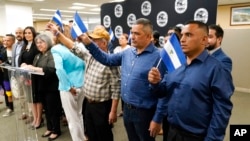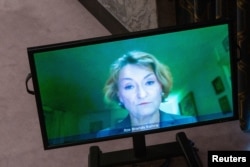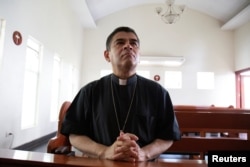The Office of the U.N. High Commissioner for Human Rights has denounced as illegal the Nicaraguan government's move to strip hundreds of political opponents of President Daniel Ortega of their citizenship.
"These arbitrary and disproportionate actions and measures, including those imposed retroactively, violate Nicaragua's international human rights commitments," said Assistant Secretary-General for Human Rights Ilze Brands Kehris, who presented the high commissioner's latest update on Nicaragua to the U.N. Human Rights Council on Friday.
She noted that a first wave of 222 people, who "had been arbitrarily deprived of their liberty," had been "deported" from the country on February 9 and rendered stateless the same day.
The action, she said, came after the National Assembly of Nicaragua approved a law declaring that those sentenced as "traitors to the homeland" should lose their Nicaraguan nationality.
A week later, on February 15, a second wave of 94 individuals were exiled, stripped of their nationality, and declared "fugitives."
Kehris said that those affected include human rights defenders, journalists, activists, and social and political leaders in exile and in Nicaragua.
"They have a chilling effect on many Nicaraguans both within the country and in exile," she said.
The report also condemns the lengthy imprisonment, without trial, of the bishop of Matagalpa, Monsignor Rolando Alvarez, who refused to be deported from the country and was stripped of his Nicaraguan nationality.
The report documents other serious human rights violations since the beginning of this year, including acts of violations of indigenous people's rights, such as the "persistent illegal occupation of their territories and the exploitation of natural resources without their free, prior, and informed consent."
Wendy Carolina Morales Urbina, Nicaragua's attorney general, "firmly and totally" rejected what she called "this malicious and persistent use of this mechanism of oral update."
She said the only purpose of this mechanism was "to harm our sovereignty and independence" by presenting "biased and subjective information" aimed at undermining our ability to achieve the "well-being of our nation as pillars of human rights."
Coinciding with the high commissioner's oral update, the three-member Group of Human Rights Experts on Nicaragua has just issued a report, which accuses the government of Daniel Ortega of "widespread and systematic human rights violations that amount to crimes against humanity and are motivated by political reasons."
Jan-Michael Simon, chair of the Group of Experts, said the violations include "extrajudicial executions, arbitrary detentions, torture, arbitrary deprivation of nationality and violations to the right to remain in one's own country."
"They are not isolated incidents," he said, "but the product of the deliberate dismantling of democratic institutions and destruction of civic and democratic space."
Nicaragua did not grant the investigators access to the country. Consequently, the group gathered its information from available documents and hundreds of interviews and testimony from officials, victims, witnesses, and civic and human rights organizations in areas near Nicaragua.
The report finds high-level authorities have used the executive, legislative, judicial and electoral branches to repress fundamental freedoms and persecute "opposing persons."
"The objective is to eliminate, by different means, any opposition or dissenting voices in the country," said Simon. "This has resulted in the Nicaraguan population living in fear of the actions that the government may take against them."
Since December 2018, the report notes at least 3,144 civil society organizations have been shut down as well as virtually all independent media and human rights organizations.
Human rights expert Angela Maria Buitrago said the situation continues to worsen.
"All these actions are possible because the state has been used as a weapon of persecution against the population," she said.
The group concluded that "President Daniel Ortega and Vice President Rosario Murillo have put into practice patterns of these crimes and continue to do so as of the date of the report."
The three investigators said they shared the report with Nicaraguan authorities before its release but have received no response.






